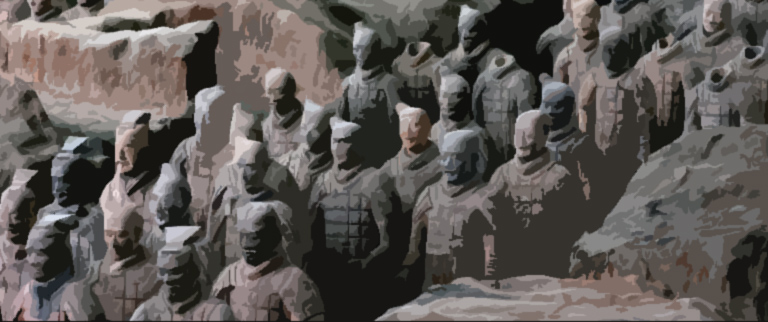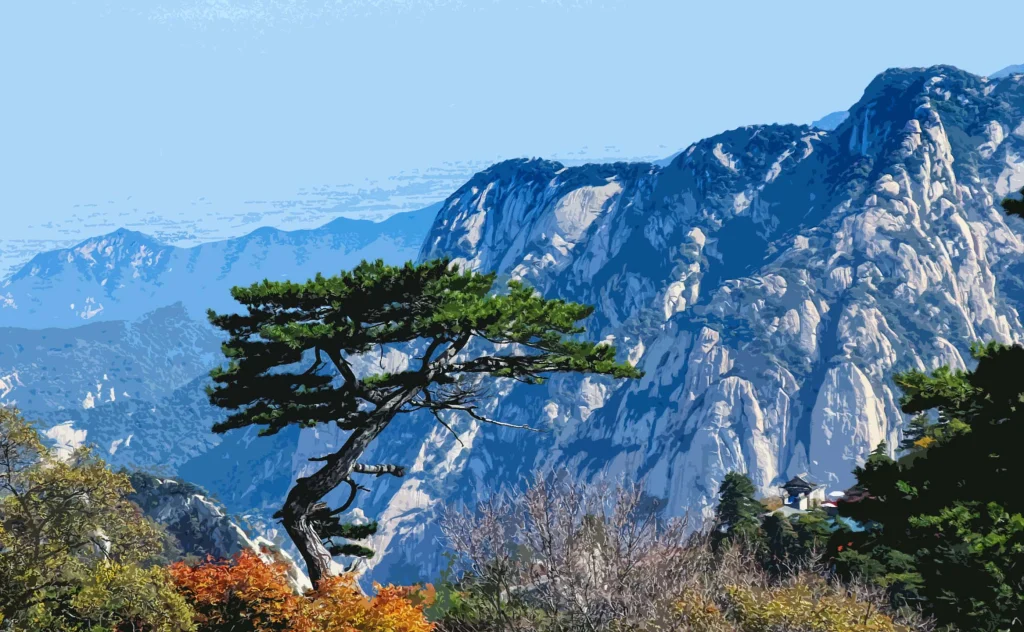A winding stream, the smell of pine in the wind,
A gray rat flees under ancient tiles.
I don’t know whose royal palace is this,
Mislaid beneath steep cliffs.
In dark rooms ghostly fires glow green,
A sorrowful stream flows over a broken path.
A million sounds from the earth are the true flutes and reeds
Autumn is sprinkled in colors positively sad.
Palace beauties have turned into yellow dust,
And what’s more, scattered are their powders and paints.
Where once they awaited a glorious golden chariot,
Now, of those things, only the stone horse remains.
Cares come, and to the grass I sink,
Singing loudly, while tears fill my hands.
On and on, a traveler slowly on his way
But who is he who lives forever?
What
Du Fu’s Yuhua Palace is an example of huaigu 懷古, a reflection on things past, a type of nostalgia recognizing the transitory nature of all things. Death comes to us all. Palace beauties turn into dust, and of golden chariots, only the statues of horse remain. The Roman and Latin equivalent is Sic transit gloria mundi, Thus passes the glory of the world.
When
The generally accepted date for this poem is 757. If correct, then it was written during the An Lushan Rebellion (755 – 763), after the fall of the capital of Chang’an, when all of China was in chaos. If we attempt to be more specific with the date, it may have been written during that period of time when Du Fu was granted leave by the Imperial court in exile to visit his family. Du Fu would continue to write poems in the Qiang Village where his family waited out the rebellion.
Where
Yuhua Palace, in far western Shaanxi province, built in 647 by Emperor Taizong as a Summer Palace. In 651, it was converted into a temple where the Buddhist master Xuanzang (602-664) lived and died, working on translating Indian Buddhist texts.
Shaanxi province on the edge of the Huangtu Plateau (literally, Yellow Earth plateau), is the location of the terra cotta army that contains vast numbers of statues of soldier and horses. .

Notes on translating Yuhua Palace
The first four lines seem straight forward. Du Fu approaches the ruins of the ancient palace walking along a meandering stream. In the air is the wind blown scent of pine trees, 松 風, sōng fēng, literally pine and wind, wind in the pines, or, as I prefer, the scent of pine in the wind. The palace is empty, save the gray rats that scurry in the ruins.
In the fifth line, Du Fu makes reference to a green ghostly fire, 鬼 火, guǐ huǒ. This may refer to the phosphorescence sometimes seen in caves or more likely to sighting the will o wisp, an atmospheric ghostly light travelers often see at night in marshy areas. Du Fu then refers to a myriad of natural vents in the earth that emit a sound similar to two types of Chinese flutes, 笙 and 竽, shēng and yú.
In line nine, Du Fu remarks that the palace beauties have all turned to yellow dust, 黃土, huángtǔ, literally yellow earth . This is a popular Chinese belief that the Yellow Earth is made up of the Chinese people. The historic northern boundary of China is the Yellow River, 黄河, Huáng Hé.
Again, in line 9, Du Fu uses the Chinese characters 美人, měi rén, which should be translated as a lady or as a consort. Such ladies would be escorted about the area in a golden chariot drawn by horses. Now, the ladies are gone, turned to yellow dust, the wooden chariots gone, and the only thing remaining, are the famous statues of terra cotta horses.
In the last four lines, Du Fu becomes thoughtful. Overcome with sorrow, he sinks to the ground, and begins to sing loudly, we assume using a Buddhist chant, tears welling up in his eyes, his hands clasped together in prayer.
Then, Du Fu acknowledges that he too is a lonely traveler, and that life is transitory.
Chinese text
玉華宮
溪回松風長
蒼鼠竄古瓦
不知何王殿
遺構絕壁下
陰房鬼火青
壞道哀湍瀉
萬籟真笙竽
秋色正蕭灑
美人為黃土
況乃粉黛假
當時侍金輿
故物獨石馬
憂來藉草坐
浩歌淚盈把
冉冉征途間
誰是長年者












